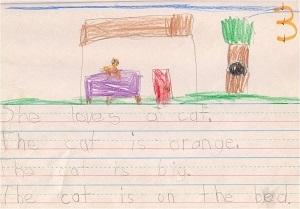 Students come to us with a wide variety of background information and “knowns.” We can’t control what we get sent to us, but we can control what we do with it. There is no other grade responsible for the amount of growth that kindergartners are expected to make, there is also no other grade more misunderstood. Kindergarten is the best and worst of education today. To see a child make their first connection in a kindergarten classroom is unforgettable and “the best moment” can come in the form of writing their name, matching letters, determining rhymes or reading stories. It could also be a smile, an attempt, or a choice made carefully. Consequently, kindergarten is also littered with “the worst moments.” In today’s era of pacing guides and continuums developed to complete a set number of skills in a set number of meetings—regardless of developmental milestones—kindergarten teachers are faced with the ongoing internal debate of what is appropriate for 5-year-olds and what is expected. Regardless, we cannot use the excuse, “They can’t do it, they are just kindergartners.”
Students come to us with a wide variety of background information and “knowns.” We can’t control what we get sent to us, but we can control what we do with it. There is no other grade responsible for the amount of growth that kindergartners are expected to make, there is also no other grade more misunderstood. Kindergarten is the best and worst of education today. To see a child make their first connection in a kindergarten classroom is unforgettable and “the best moment” can come in the form of writing their name, matching letters, determining rhymes or reading stories. It could also be a smile, an attempt, or a choice made carefully. Consequently, kindergarten is also littered with “the worst moments.” In today’s era of pacing guides and continuums developed to complete a set number of skills in a set number of meetings—regardless of developmental milestones—kindergarten teachers are faced with the ongoing internal debate of what is appropriate for 5-year-olds and what is expected. Regardless, we cannot use the excuse, “They can’t do it, they are just kindergartners.”
Seriously! Just kindergartners? What does that even mean? Are we just teachers? No, we are the most important people in the lives of school children and we can determine who they can become. Just kindergartners? Nothing makes me crazier than when teachers, administrators, and so-called specialists give the excuses for children not performing BEFORE they give the children the tools they need to achieve.
As a veteran kindergarten teacher, I presented a workshop on emergent writing at the Virginia State Reading Association Conference several years ago. The workshop offered attendees several methods for teaching writing, ideas for editing, lessons for mechanics, and rubrics for assessment. The key to teaching writing to emergent learners is the same as it is for teaching any other skill: strategic well-planned lessons with consistent modeling and ample practice. Using what they know (letters, letter/sound associations, word wall activities) takes away the fear of writing. They can be taught to rely on themselves and refrain from asking “how do you spell that?” Teaching the beginning basics of mechanics can be as easy as a song and practice. Using student friendly rubrics can provide students with the skills to self-correct and self-monitor their writing. I provided work samples and student products showing compositions of four, five, six sentences and more. I showed journals with concise stories containing a beginning, middle, and end and some even contained a surprise ending, demonstrated voice and used inspired word choices. After the presentation several attendees came up to talk about my ideas and see the student’s work samples up close. Many were taking pictures and asking questions. An administrator from a struggling school system came to me and started the conversation by saying, “I think you are lying.”
“Excuse me?” I was stunned and even confused.
“I don’t think these are kindergarten samples,” she continued.
“Excuse me,” I repeated. “Who are you?” I asked.
“I am ABC from XYZ Schools and kindergartners can’t do that. Writing isn’t tested in this state until fifth grade, so why would you start ‘teaching’ (she said with air quotes) kindergarten students to write. They can’t do it.”
Well, as you can imagine, I was taken aback. First, she had questioned my honesty, but most importantly, she had questioned my students. Not a good plan.
“You don’t know me and you don’t know my students, but these are, in fact, their products from good teaching. Don’t tell me kindergartners can’t do that! You may not have faith in kindergarten students, but if you teach them, they will write.”
This was the most blatant assault on my integrity I have ever encountered. But more importantly, she had doubted my students and that hurt. My students work hard every day and don’t doubt their ability. In fact, they don’t know failure is an option, because it isn’t. Lessons are carefully crafted with success in mind.
I offered the administrator an open invitation to my classroom. She was welcome any day and any time. She declined. When the conference was over, I emailed this administrator, again inviting her to my classroom. I told her I would put her name on the guest list through the end of school and I asked her to come unannounced. She did not return my email and she never visited.
Don’t tell me kindergartners can’t do that!
Giving kindergartners the tools, the practice, and the confidence to write will open their eyes to a new avenue of exploration. They will want to write stories. They will want to edit their writing to make it better. They will want to write to entertain, inform or persuade their audience. It is an achievable goal for everyone.
I tried to conduct myself as professionally as I could with her. But my internal conversation wasn’t so professional. I truly believe one of the biggest struggles of her school system is her. She didn’t believe in her teachers or the students in her system. How can students be expected to be successful on any writing test if they aren’t taught strategically and consistently from the earliest stages of learning? You can tell me the teachers aren’t educated on how to teach kindergarten students. You can tell me the school system isn’t providing adequate professional development on how to teach kindergarten students. You can even tell me your expectations for kindergarten students are set too low. But don’t tell me kindergartners can’t do that!
 Cathy Collier is a reading specialist at Great Bridge Primary School in Chesapeake, Virginia with an additional 15 years as a kindergarten teacher. She has her B.S. in Special Education, a master’s degree in Special Education and a certified reading specialist. She is the immediate past president of the Virginia State Reading Association
Cathy Collier is a reading specialist at Great Bridge Primary School in Chesapeake, Virginia with an additional 15 years as a kindergarten teacher. She has her B.S. in Special Education, a master’s degree in Special Education and a certified reading specialist. She is the immediate past president of the Virginia State Reading Association